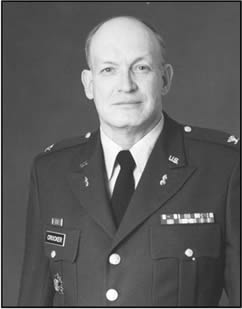Colonel
William R. Crocker
 Colonel William R. Crocker was born on May 18, 1944, in Philadelphia, Mississippi and joined the Mississippi Army National Guard on February 21, 1964. He completed basic training at Fort Polk, LA in 1965 and Advanced Individual Training as a Radio Mechanic at Fort Hood, Texas in January 1966. He returned to his unit and served as a Radio Mechanic until commissioned a Second Lieutenant on July 10, 1967. Upon the reorganization of his Armor unit in 1968, Colonel Crocker branch transferred from Armor to Ordnance.
Colonel William R. Crocker was born on May 18, 1944, in Philadelphia, Mississippi and joined the Mississippi Army National Guard on February 21, 1964. He completed basic training at Fort Polk, LA in 1965 and Advanced Individual Training as a Radio Mechanic at Fort Hood, Texas in January 1966. He returned to his unit and served as a Radio Mechanic until commissioned a Second Lieutenant on July 10, 1967. Upon the reorganization of his Armor unit in 1968, Colonel Crocker branch transferred from Armor to Ordnance.
He sharpened his technical, tactical, and leadership skills through assignments in Army National Guard (ARNG) units and quickly ascended the officer ranks by meeting all challenges as a platoon leader, shop chief, and battalion staff officer. He commanded the 367th Ordnance Company, Mississippi Army National Guard in 1976.
After the Ordnance Advance Course, Crocker was assigned to the Ordnance Center and School (OC&S) at Aberdeen Proving Ground as the Logistics Simulation Exercise Project Officer. He was a crucial player in the development and instruction of the OC&S’s Logistics Simulation Exercise (ATLAS). In 1981, the National Guard Bureau transferred Crocker to the Materiel Branch, Logistics Division. As a Logistics Staff Officer, Crocker’s responsibilities included maintaining close communications with the Department of the Army Staff. Crocker worked diligently to improve the ARNG’s equipment readiness.
In 1984, Crocker was selected to serve as the ARNG Advisor to Army Forces Command (FORSCOM) Deputy Chief of Staff for Logistics (DCSLOG). Armed with a wealth of knowledge and experience in Total Army issues, he established himself quickly with the Army Reserve and the Active Army as the FORSCOM focal point for ARNG assets and solidified the Guard’s position as a full partner within the Total Army Concept.
Crocker was selected in 1987, by the National Guard Bureau Chief of Army Logistics, as the ARNG advisor to the Commanding General, Tank-Automotive Command (TACOM). In this capacity, he was responsible for reviewing, developing, and recommending command initiatives and policies. Crocker was pivotal in advising the CG on ARNG Congressional Dedicated Procurement, M1 tank fielding, and tactical vehicle modernization issues.
Following attendance at the Industrial College of the Armed Forces, Crocker was promoted to Colonel and reassigned as ARNG Advisor, Office of the DCSLOG, Department of the Army. This assignment provided Crocker the opportunity to work on further strengthening the ARNG-Active Army partnership. His experience and understanding of logistics requirements resulted in enhanced maintenance, supply, and training opportunities for the Guard. During Operation Desert Shield and Operation Desert Storm, he worked to ensure National Guard capabilities and concerns were identified as ARNG units were mobilized to support the call up.
Crocker was selected by the Chief of the National Guard Bureau to be the Chief of the Army Logistics Directorate in 1991. As the leader of the Guard's logistics organization, he immediately set to work in making the Guard's logistics operations models of effectiveness and efficiency. To improve the ARNG’s mission accomplishment, he reorganized the Logistics Directorate. He instilled in his staff the desire to seek and implement initiatives that dramatically improved combat readiness while reducing costs. Crocker led an aggressive drive to automate the ARNG’s logistics facilities and gave priority to the development and test of futuristic programs.
From 1996 until retirement Colonel William R. Crocker served in two positions, the Deputy Director of the Army National Guard's Installation, Logistics, and Environment (IL&E) Directorate and as the Assistant Deputy Director of the Army National Guard for Support (later designated as the ARNG G4), where he was responsible for working with the Department of the Army to secure funding to support all missions of the Army National Guard. While in these positions he was instrumental in improving the readiness of the ARNG by using funds provided by Congress and the Department of the Army to buy modern equipment that supported the federal and state mission of the ARNG.
Colonel William R. Crocker retired on September 30, 1998.